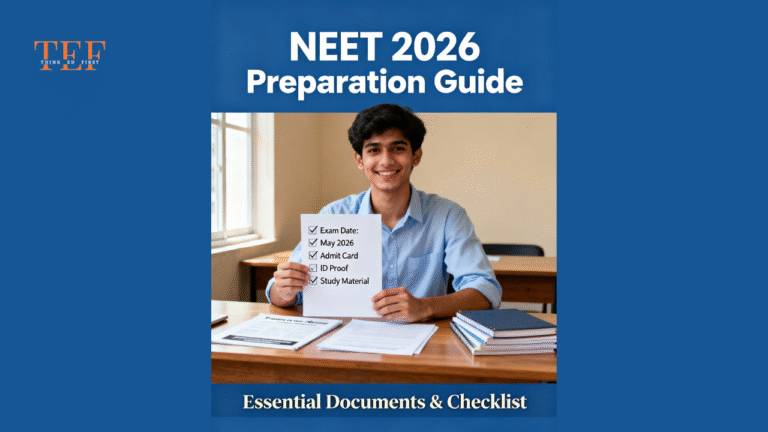How can you excel in both school and the NEET exam without burning out? This question haunts thousands of students every year. The journey to cracking one of India’s most competitive exams is challenging, but it’s not impossible. With the right strategies, you can manage your academic responsibilities while preparing effectively.
Many aspirants have successfully balanced their studies with exam preparation. They focused on smart planning, quality study materials, and consistent practice. The key lies in understanding the syllabus and prioritizing topics that matter most.
In this guide, we’ll explore practical tips to help you stay on track. From time management to revision strategies, we’ve got you covered. Let’s dive into how you can achieve your goals without compromising on either front.
Understanding the NEET Exam and Academic Responsibilities
Preparing for the NEET exam while managing schoolwork requires a clear understanding of both demands. To crack NEET, students must first grasp the syllabus, exam format, and how it aligns with their academic responsibilities. This section breaks down these aspects to help you plan effectively.
Overview of the NEET Syllabus and Format
The NEET syllabus covers three main subjects: Physics, Chemistry, and Biology (Botany and Zoology). These topics are based on the NCERT curriculum for classes 11 and 12. Here’s a quick breakdown:
- Physics: Topics like Mechanics, Thermodynamics, and Optics are crucial.
- Chemistry: Focus on Organic, Inorganic, and Physical Chemistry.
- Biology: Botany and Zoology concepts form the majority of questions.
The exam consists of 180 multiple-choice questions, with 45 from each subject. Each correct answer awards 4 marks, while incorrect ones deduct 1 mark. Time management is key, as you have only 3 hours to complete the paper.
Academic Demands in School and College
Balancing school or college with NEET preparation can be challenging. Academic responsibilities often include regular classes, assignments, and exams. These demands can overlap with NEET topics, but they also require separate attention.
NCERT textbooks are essential for both school and NEET preparation. They provide a strong foundation for understanding core concepts. Additionally, previous year question papers and mock tests can help you identify important topics and practice effectively.
Here are some tips to manage both:
- Create a study schedule that includes time for schoolwork and NEET topics.
- Use weekends for focused NEET preparation and revision.
- Take short breaks to avoid burnout and maintain productivity.
By understanding the syllabus and academic demands, you can create a balanced approach to crack NEET without compromising your school performance.
Building a Realistic Study Plan
Crafting a study plan that works is the first step toward achieving your goals. A well-structured approach ensures you cover all essential topics while managing your time effectively. Let’s explore how to create a plan tailored to your needs.
Assessing Your Strengths and Weaknesses
Understanding your strengths and weaknesses is crucial for efficient preparation. Start by taking diagnostic tests to evaluate your grasp of key subjects. This helps identify areas that need more focus.
Here’s how to assess your performance:
- Review previous test results to spot patterns.
- Use NCERT textbooks to reinforce foundational concepts.
- Practice questions from high-weightage topics to gauge your understanding.
Creating a Flexible Timetable
A flexible timetable is essential for balancing multiple responsibilities. Allocate specific time slots for each subject and topic. This ensures you cover all areas without feeling overwhelmed.
Follow these steps to design your schedule:
- Divide your day into focused study sessions of 1-2 hours.
- Include short breaks to maintain productivity.
- Set aside weekends for revision and mock tests.
Regularly adjust your plan based on periodic self-assessments. This keeps your preparation on track and ensures continuous improvement.
Effective Time Management Strategies
Mastering time management is the cornerstone of success in competitive exams. It helps you stay organized, focused, and productive throughout your preparation journey. By prioritizing tasks and using proven techniques, you can maximize your score potential without feeling overwhelmed.
Prioritizing High-Weightage Topics
Focusing on high-weightage topics ensures you cover the most important concepts first. This approach not only boosts your confidence but also increases your chances of scoring well. Here’s how to prioritize effectively:
- Identify topics with the highest marks in previous exams.
- Allocate more study time to challenging subjects.
- Use concise notes to quickly review key concepts during breaks.
Incorporating Regular Breaks and Downtime
Taking regular breaks is essential for maintaining focus and avoiding burnout. Techniques like the Pomodoro Technique can help you stay productive. Study for 25 minutes, then take a 5-minute break. This keeps your mind fresh and energized.
Here are some actionable tips to integrate breaks into your routine:
- Set realistic goals for each study session.
- Use breaks to relax, stretch, or review quick notes.
- Track your progress and adjust your schedule as needed.
By following these effective time management strategies, you can balance your preparation with other responsibilities. Stay consistent, and you’ll see steady progress toward your goals.
Leveraging Quality Study Materials
Choosing the right study materials can make or break your preparation journey. High-quality resources help you grasp complex concepts, practice effectively, and stay ahead in your studies. Let’s explore how to select and use the best tools for success.
Utilizing NCERT Textbooks and Reference Books
NCERT textbooks are the foundation of your preparation. They cover the entire syllabus and align perfectly with the exam pattern. These books simplify complex topics and provide clear explanations.
For deeper understanding, supplement your study material with reference books. Titles like “Concepts of Physics” by H.C. Verma and “Trueman’s Biology” are highly recommended. They offer detailed insights and practice questions.
| Resource | Purpose | Key Features |
|---|---|---|
| NCERT Textbooks | Foundation for syllabus | Clear explanations, aligned with exam pattern |
| Concepts of Physics | Advanced practice | Detailed problem-solving techniques |
| Trueman’s Biology | In-depth concepts | Comprehensive coverage of Botany and Zoology |
Accessing Trusted Online Resources
Digital platforms like Khan Academy offer interactive lessons and quizzes. These resources make learning engaging and help reinforce key concepts. They are especially useful for visual learners.
Organize your study material for quick reference. Use folders or apps to categorize notes, practice papers, and video lectures. This approach saves time and keeps you focused.
Combine different formats like text, videos, and quizzes for a well-rounded learning experience. This technique ensures you retain information better and stay motivated throughout your preparation.
Techniques for Active Revision and Concept Mastery
Effective revision techniques can transform your preparation and boost your confidence. By focusing on active learning methods, you can retain information better and perform well in exams. Let’s explore proven strategies to master concepts and make revision more efficient.
Active Recall and Spaced Repetition
Active recall involves testing yourself on key concepts instead of passively reading notes. This technique strengthens memory and improves long-term retention. Pair it with spaced repetition, where you revisit topics at increasing intervals, to reinforce learning.
Here’s how to use these techniques:
- Create flashcards for quick self-testing on important topics.
- Schedule revision sessions with increasing gaps between them.
- Focus on areas where you struggle to build confidence.
Utilizing Diagrams, Mind Maps, and Flashcards
Visual aids like diagrams and mind maps simplify complex topics. They help you see connections between ideas and make revision more engaging. Flashcards are perfect for quick, daily practice on key facts and formulas.
Follow these steps to use visual aids effectively:
- Draw mind maps to organize information by themes or chapters.
- Use diagrams to visualize processes, especially in Biology and Physics.
- Review flashcards daily to reinforce your memory.
Testing yourself regularly is crucial for evaluating knowledge retention. Incorporate mock tests and practice papers into your routine. This approach not only prepares you for the exam format but also highlights areas needing improvement.
For more insights on balancing your preparation, check out these effective time management strategies. By combining these techniques, you can master concepts and excel in your exams.
Staying Motivated and Maintaining Consistency
Staying motivated and consistent is key to achieving success in any competitive exam. It’s easy to feel overwhelmed, but with the right strategies, you can keep your focus sharp and your energy high. Let’s explore how to set achievable goals and celebrate small wins to stay on track.
Setting Achievable Goals
Setting realistic and measurable goals is the first step toward staying motivated. Break your preparation into smaller tasks that you can accomplish daily or weekly. This approach makes the process less daunting and helps you track your progress effectively.
Here are some tips to set SMART goals:
- Be specific about what you want to achieve in each study session.
- Measure your performance through regular self-assessments and mock tests.
- Adjust your goals based on your progress and challenges.
Celebrating Small Successes
Celebrating small wins can boost your confidence and keep you motivated. Whether it’s mastering a tough topic or improving your mock test score, acknowledging these achievements helps you stay positive and focused.
Here’s how to celebrate effectively:
- Reward yourself with a short break or a favorite activity after completing a goal.
- Keep a journal to note your achievements and reflect on your progress.
- Share your successes with peers or mentors for added encouragement.
Consistency is built through small, daily efforts. By setting achievable goals and celebrating your progress, you can maintain motivation and achieve long-term success. Stay focused, and remember that every step forward counts.
Strategies for neet with regular studies
Balancing academic responsibilities with exam preparation demands a strategic approach. Many students find it challenging to manage both, but with the right techniques, it’s achievable. Let’s explore how to create a balanced routine and manage stress effectively.
Creating a Balanced Daily Routine
A well-structured schedule is the foundation of success. Start by allocating specific time slots for academic work and exam prep. This ensures you cover all subjects without feeling overwhelmed.
Here’s a sample routine to help you get started:
| Time | Activity |
|---|---|
| 6:00 AM – 7:30 AM | Focus on high-weightage topics for exam prep |
| 8:00 AM – 2:00 PM | Attend school or college classes |
| 3:00 PM – 5:00 PM | Revise academic subjects and complete assignments |
| 6:00 PM – 8:00 PM | Practice mock tests or solve previous year papers |
| 8:30 PM – 9:30 PM | Relax and engage in leisure activities |
Adjust this plan based on your academic demands and exam preparation needs. Flexibility is key to maintaining consistency.
Managing Stress and Avoiding Burnout
Stress is inevitable, but it can be managed effectively. Incorporate regular breaks into your schedule to recharge your mind. Physical activities like yoga or a short walk can also help reduce tension.
Here are some practical tips to stay stress-free:
- Take a 10-minute break every hour during study sessions.
- Practice mindfulness or meditation to stay focused.
- Maintain a healthy diet and get 6-7 hours of sleep daily.
By balancing study sessions with leisure activities, you can avoid burnout and stay motivated throughout your preparation journey.
Self-Assessment and Continuous Improvement
Continuous self-assessment is a powerful tool for refining your preparation strategy and achieving success. By regularly evaluating your performance, you can identify strengths and weaknesses, adjust your approach, and stay on track. This process ensures you’re always moving forward and making the most of your study time.
Regular Mock Tests and Practice Sessions
Mock tests are essential for evaluating your progress and building exam readiness. They simulate the actual exam environment, helping you manage time and stress effectively. By taking these tests regularly, you can identify areas that need more focus and track your improvement over time.
Here’s how to make the most of mock tests:
- Schedule tests weekly to maintain consistency.
- Analyze your performance to spot patterns in mistakes.
- Focus on high-weightage topics to maximize your score.
Analyzing Previous Years’ Question Papers
Reviewing previous year question papers is a proven way to understand the exam pattern and question trends. These papers provide valuable insights into the types of questions asked and the level of difficulty. By practicing them, you can develop a strategy to tackle similar questions during the actual exam.
Follow these steps for effective analysis:
- Solve papers under timed conditions to improve speed and accuracy.
- Identify recurring topics and prioritize them in your revision.
- Use the papers to create a personalized study plan.
| Activity | Benefits |
|---|---|
| Mock Tests | Simulate exam conditions, identify weak areas, and improve time management. |
| Previous Year Papers | Understand exam pattern, practice question types, and build confidence. |
| Practice Sessions | Reinforce concepts, enhance problem-solving skills, and reduce exam anxiety. |
Using online platforms for mock tests and tracking results can further enhance your preparation. These tools provide detailed feedback, helping you refine your study techniques and improve overall performance. Continuous self-assessment, combined with regular practice, ensures you’re always progressing toward your goals.
Conclusion
The journey to cracking competitive exams demands focus, consistency, and smart planning. A structured approach, quality study materials, and persistent practice are essential to crack NEET. Balancing academics and exam preparation is achievable with the right strategy.
Understanding the syllabus, setting achievable goals, and continuous self-assessment are key steps. Trusted resources like NCERT textbooks and regular mock tests play a vital role in preparation. Effective time management and a disciplined study plan ensure steady progress.
By adopting these methods, you can stay motivated and confident. Success in the NEET exam is within reach with consistent effort and proper planning. Take the first step today and work toward your goal with determination.





